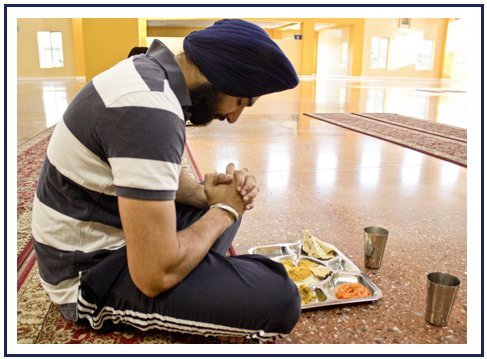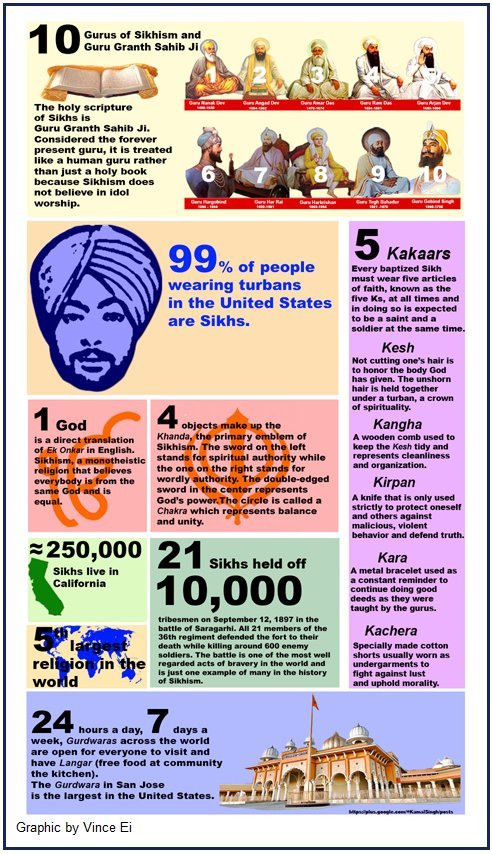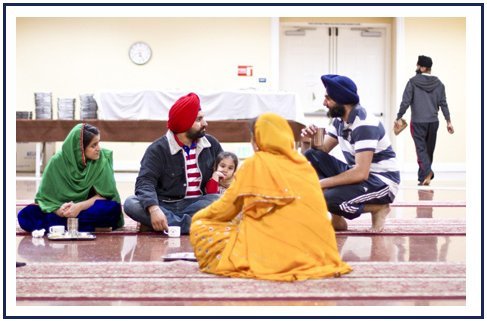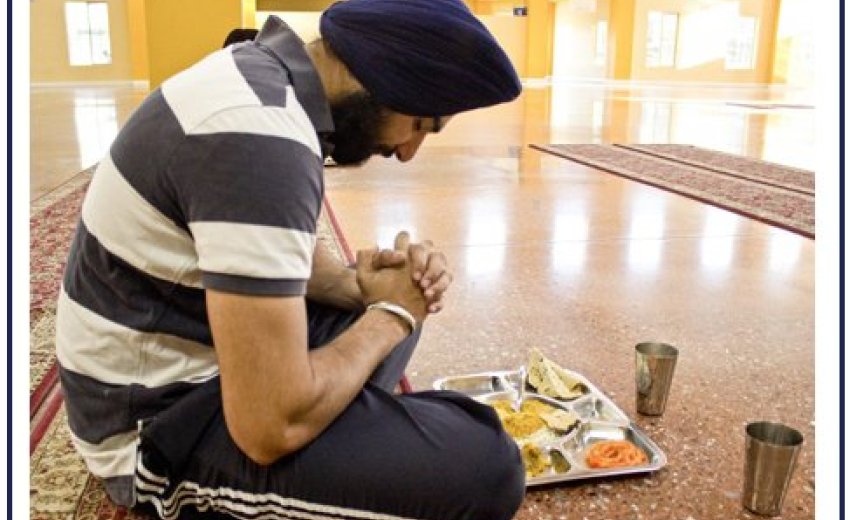 April 24th, 2013: Pardeep Singh Bajwa has never cut his hair. Ever.
April 24th, 2013: Pardeep Singh Bajwa has never cut his hair. Ever.
The hair that extends down the back of his burly 6-foot-2-inch frame is bundled up into a compactly wound black turban.
The unshorn hair spreads down the sides of his head and creates an expansion of black hair around his chin to give him a dense beard.
Bajwa is not a Muslim or a Hindu like some may believe based on his appearance. He is a Sikh.
For all the misrepresentation Bajwa said men like him, who have long beards and wear turbans, face in the media, he gives a resilient response.
“The Sikh identity makes me stand out, which is pretty cool,” he said.
But behind this steadfast outlook regarding his appearance, he said there is some animosity toward the media for heavily associating the most visible Sikh characteristic to terrorism, especially in the wake of the Sept. 11 attacks.
“Most people associate turbans with al-Qaida, Taliban or Arabs, which is very wrong,” Bajwa said. “A vast majority of turban wearing people in the West are Sikhs.”
Bajwa recalled a time when he and his friends tried to go into a Christian church and stuck out a little too much.
 They were denied entrance into the church and Bajwa said he didn’t know why, but the incident does not discourage him because of the generations before him who have overcome similar discrimination and stood firm in their beliefs.
They were denied entrance into the church and Bajwa said he didn’t know why, but the incident does not discourage him because of the generations before him who have overcome similar discrimination and stood firm in their beliefs.
“I am proud to be a Sikh because our Gurus, the spiritual teachers, showed how living a life full of spirituality, compassion, simplicity, humility and respect for all can transform a society,” he said. “These people eventually drove the oppressors out and formed their own states and kingdoms. My pride is rooted in the accomplishments of our Gurus and our ancestors.”
Jasdeep Singh Arneja, a graduate student in software engineering and friend of Bajwa, said he knows somebody with a similar experience.
“I have another friend who was denied an entrance to church in the U.K. because he was wearing a turban and he refused take it off before entering the church,” Arneja said. “It’s even more difficult for me to digest this fact as in a Sikh Gurdwara (the place of worship for Sikhs) everyone is welcome and is treated absolutely equal.”
Bajwa and Arneja said they don’t believe these incidents are representative of the religion as a whole because they have experienced more good nature than bad from all kinds of people, but prejudice still happens.
Much controversy has been made of the turban and it has become a symbol in its own, but in Sikhism even more symbolic than the turban is the hair underneath.
 A baptized Sikh must wear five articles of faith at all times which are, as listed on SikhNet: Kesh which is the uncut hair, a bracelet called the Kara, a dagger called a Kirpan, undergarments called Kachera, and a comb called the Kangha.
A baptized Sikh must wear five articles of faith at all times which are, as listed on SikhNet: Kesh which is the uncut hair, a bracelet called the Kara, a dagger called a Kirpan, undergarments called Kachera, and a comb called the Kangha.
“I was 10 years old when I wore the Five Ks first time,” Bajwa said. “I trusted my parents and didn’t question the meaning or significance of the articles. As time passed by I learned more about our history and culture and started understanding the relevance and significance of the Five Ks.”
The Kesh is the most notable in the image of a Sikh, but most of what makes up the physical identity of a baptized Sikh, such as the Kachera and Kangha, remains hidden.
The most interesting article being the Kirpan which equips each devout Sikh to be a soldier for humanity and “is committed to righteously defend the fine line of the truth,” as stated by SikhNet.
Bajwa carries a six-inch Kirpan beneath his clothes at all times and has drawn it out twice to protect a friend in danger, but even in times of peril, he said it is used as the last resort.
Most other ways he said he contributes to Sikhism are less confrontational.
He said you can find him on Friday nights at the Gurdwara with a group of students who voluntarily clean it.
Arneja is also a part of that group and said the deed strengthens the bonds between each other and to their faith.
“It has been a great experience for me and everyone who has participated,” he said. “While I am doing the cleaning service I get the feeling of selflessness and being in service of God … I get time to reflect upon my life and how I can be a better person.”
Bajwa was born in a city called Patiala in Northern India and said he has always been helpful in his local Gurdwaras.
“I can clearly recall the times when I used to spend time at the Gurdwara in my village,” Bajwa said. “I really liked giving a helping hand with cleaning and serving at the Gurdwara. This way of helping voluntarily without expecting anything in return is highly regarded in Sikhism.
The Sikh Gurdwara Sahib of San Jose on Murillo Avenue is the largest in the United States, and according to Bajwa, all 40 acres is public property which belong to no particular person.
“This place belongs to God and anyone who is on this property is equal,” Bajwa said. “If you are in the Gurdwara, nobody can deny you anything because nobody is considered higher than the other.”
This particular Gurdwara in San Jose is a haven for weary travelers tumbling into town because it provides free lodging for those in need, according to Bajwa.
It also serves free Indian food 24 hours a day — much like other Gurdwaras all over the world as instructed by Guru Nanak Dev Ji, the first of the Ten Gurus of Sikhism, who championed equality and inclusiveness, Arneja said.
Page 282 of the Sri Guru Granth Sahib Ji, the holy scripture of of Sikhs, states, “The light of God is found in all hearts.”
Sikh or not, Bajwa said everybody is welcome and has access to all the services at a Gurdwara, and not only is anybody free to enter the Gurdwara, but also to practice Sikh beliefs. What it takes to be a Sikh
“The true essence of being a Sikh is to keep your ego in check, be humble, hardworking, honest, compassionate and spiritual,” he said. “Anyone who lives like this qualifies to be a good Sikh.”
But the responsibilities that come with being a good Sikh — such as the boldness to wear a turban in a hostile society, the courage to intervene with a Kirpan at any moment, and the hospitality to donate one’s time to service, may seem like duties reserved for the most noble citizens of humanity.
As daunting as those tasks may be, Bajwa said anyone has the potential to even be a better Sikh than he is.
He said a direct translation of the word Sikh is student, which we all are, whether in school or in life.
Religious beliefs aside, Bajwa is actually no more different than anybody else.
He is a 23-year-old senior majoring in computer science who listens to EDM and roots for the Sacramento Kings.
 “One chooses a faith and extent of adherence to it based on his or her level of understanding and depth of personal connection to the faith,” Bajwa said. “For me, Sikhism is not a religious choice, it is a way of life.”
“One chooses a faith and extent of adherence to it based on his or her level of understanding and depth of personal connection to the faith,” Bajwa said. “For me, Sikhism is not a religious choice, it is a way of life.”
The news of the shooting that took place in a Gurdwara in Oak Creek, Wis. last August that left six people dead, according to the New York Times, put grief in the hearts of Sikhs all around the world.
If there is any bright side to this, it would be an opportunity to jump-start a campaign to finally inform Americans about Sikhism, the fifth largest religion in the world, according to the Huffington Post.
“I was in Boston that time,” Arneja said. “People from all faiths and religions came out in huge numbers to attend the candlelight vigils,” Arneja said. “It was heartening to see all the support coming from people who maybe knew nothing much about Sikhism till that incident.”
In more assuring news, Bajwa is elated to hear that Sacramento’s City Council recently approved plans for a new stadium allowing the Kings to stay because rooting for any other team is something else that he won’t do, ever.
Courtesy of www.spartandaily.com/
